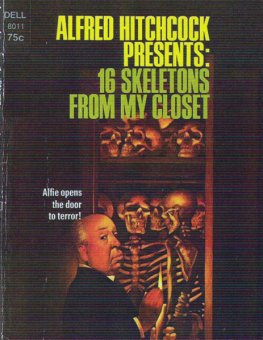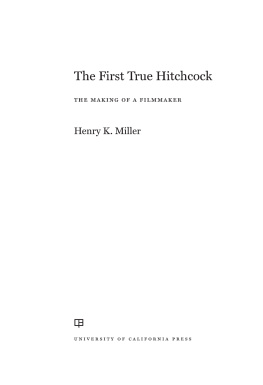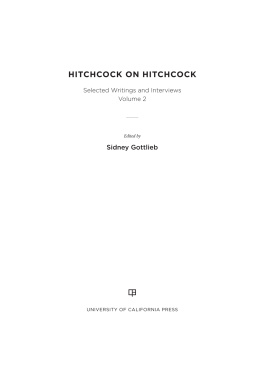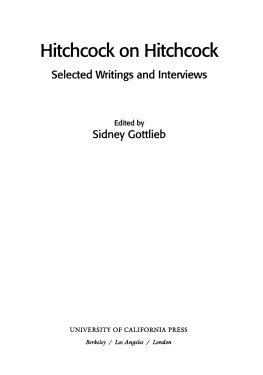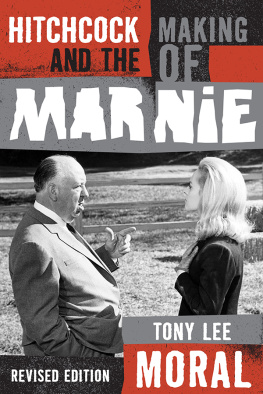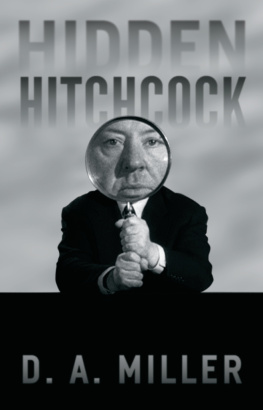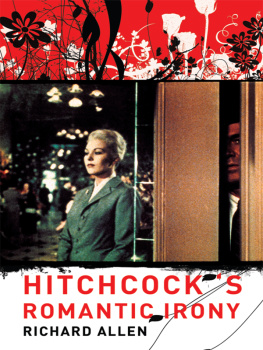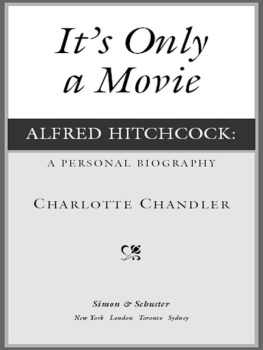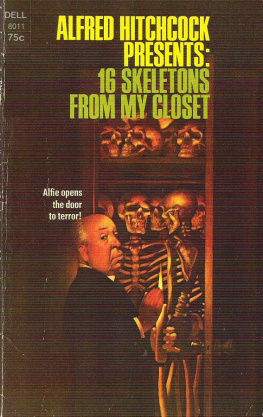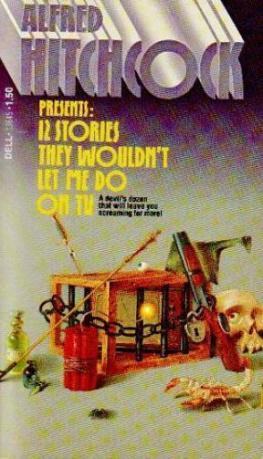The Men Who Knew Too Much
The Men Who Knew Too Much
HENRY JAMES AND ALFRED HITCHCOCK
Edited by Susan M. Griffin and Alan Nadel


Oxford University Press, Inc., publishes works that further
Oxford Universitys objective of excellence
in research, scholarship, and education.
Oxford New York
Auckland Cape Town Dar es Salaam Hong Kong Karachi
Kuala Lumpur Madrid Melbourne Mexico City Nairobi
New Delhi Shanghai Taipei Toronto
With offices in
Argentina Austria Brazil Chile Czech Republic France Greece
Guatemala Hungary Italy Japan Poland Portugal Singapore
South Korea Switzerland Thailand Turkey Ukraine Vietnam
Copyright 2012 by Oxford University Press, Inc.
Published by Oxford University Press, Inc.
198 Madison Avenue, New York, New York 10016
www.oup.com
Oxford is a registered trademark of Oxford University Press
All rights reserved. No part of this publication may be reproduced,
stored in a retrieval system, or transmitted, in any form or by any means,
electronic, mechanical, photocopying, recording, or otherwise,
without the prior permission of Oxford University Press.
Library of Congress Cataloging-in-Publication Data
The men who knew too much: Henry James and Alfred Hitchcock / edited
by Susan Griffin and Alan Nadel.
p. cm.
Includes bibliographical references and index.
ISBN 978-0-19-976442-6 (hardcover: alk. paper) ISBN 978-0-19-976443-3 (pbk.: alk. paper)
1. James, Henry, 18431916Criticism and interpretation. 2. Hitchcock, Alfred, 18991980Criticism and interpretation. 3. Motion pictures and literatureUnited States.
I. Griffin, Susan M., 1953 II. Nadel, Alan, 1947
PS2124.M46 2011
813.4dc22 2011007077
1 3 5 7 9 8 6 4 2
Printed in the United States of America
on acid-free paper
CONTENTS
SUSAN M. GRIFFIN AND ALAN NADEL
SUSAN M. GRIFFIN
BRENDA AUSTIN-SMITH
BRIAN T. EDWARDS
ALAN NADEL
MARY ANN OFARRELL
PATRICK ODONNELL
DONATELLA IZZO
JUDITH ROOF
JONATHAN FREEDMAN
ERIC SAVOY
AVIVA BRIEFEL
JOHN CARLOS ROWE
THOMAS B. BYERS
MARK GOBLE
PREFACE
Hossein Amini, screenwriter for the 1997 film The Wings of the Dove, argues that film as a medium is so well suited to subtext that Henry James is its perfect prose partner. Youre able to tell two different stories at the same time, which I think is the essence of Jamess kind of work, Amini explains. There are three or four ideas going on at the same time, which makes a film so tempting to try, to capture some sense of that. But I still think its almost impossible to capture what he does with his prose. Alfred Hitchcocks response would be, Why try? While most of Hitchcocks films were adaptations (46 of the 56 features he directed), he told Truffaut, What I do is to read a story only once, and if I like the basic idea, I just forget all about the book and start to create cinema. He considered filming literary masterpieces a fools game, insisting that Ill have no part of that! It is no accident that there is no Alfred Hitchcock film based on a novel by Henry James. But reading James with Hitchcock is another matter.
A matter of wit and a matter of serendipity, as a matter of fact. We came together, a small group of us, for a weekend symposium on James and Hitchcock, organized at Dartmouth by Donald Pease. We ate well, read papers, shared thoughts, exchanged comments, and occasionally imbibed, all with a liveliness and wit that might have delighted Lambert Strether or daunted Roger Tornhill or amused David Lodge. From these spirited, sometimes surprising, conversations emerged a panel for the 2008 James conference in Newport, Rhode Island, where enthusiastic response further titillated our imagination. What if we invited the smartest people we knewJames scholars with work on film, film scholars with acute literary sensibilitiesto pair a work by James with one by Hitchcock and make of it what they would. Given the prolific output by each master, we realized immediately the folly of looking for selections based the idea of coverage. Nor were contributors assigned either particular fictionfilm pairings or specific topics. Instead, we looked to be surprised, sometimes by the pairings, more often by the fecund range of implications found by our contributors, implications not only for the works they were discussing but also for broader issues of representation and narrative, of language and culture, of perception and interpretation suggested by the imagination that they brought to the project. To them all we are grateful, as much for the stimulating dialogues that emerged in the process of coediting, as for the relish with which they accepted the challenge of this unique intellectual adventure.
We also appreciate the support of our editor, Shannon McLachlan, and the astute and generous comments from the group of readers to whom she sent the prospectus and the manuscript. Amanda Konkle was a wonderfully deft, diligent, and reliable research assistant; Cindy Britt and Nick Wood worked meticulously and thoughtfully, often long distance. Funds from the University of Kentuckys Bryan Chair, and the University of Louisvilles Justus Bier Professorship and the University Committee on Academic Publication, helped support the project. Our spouses, Douglas Sharps and Sharon Kopyc, proved once more they understood the ways in which our lives as academics divide time unequally between domestic prudence and unruly manuscripts.
For, despite the neatness of using paired sets, The Men Who Knew Too Much is a particularly unruly manuscript, in some small way therefore comparable to the always astonishing variety and range of Jamess prose and Hitchcocks films. That is one of the reasons we chose not to align the essays chronologically, and that some films and fictions appear in more than one essay. Freed from questions of adaptation, fidelity, and interpretation, our canny critics chose to bring James and Hitchcock together as fans and scholars of both men might have wished possible.
SMG & AMN
The Men Who Knew Too Much
Reading James with Hitchcock, Seeing Hitchcock through James
Susan M. Griffin and Alan Nadel
At the turn of the nineteenth century, Henry James sought to establish the novel as a legitimate art form, even while struggling to reach a wide audience, just as, over the course of the twentieth century, Alfred Hitchcock endeavored to create popular films that were intellectually rewarding and formally complex. Famously meticulous, they both fostered and, at times, frustrated their own successes with demands for total artistic control, plotting their creations in extensive detail. Employing a distinctive stylethere is no mistaking a James sentence or a Hitchcock sceneto engage concerns at once deeply psychological and broadly social, they depicted complex characters entrammeled by manners, custom, and law. It is almost impossible to imagine how Hitchcock could, without ever looking though the camera, direct a film to render shots and sequences as rich, demanding, and nuanced as the periodic sentences James was able to shape in verbal dictation. Like their fellow genius of modernity, Pablo Picasso, both Hitchcock and James manifested a relentless reflexivity, forged out of the need to create ever more difficult intellectual and aesthetic problems, so as to push their own imaginations to their most fecund limits.
Next page

